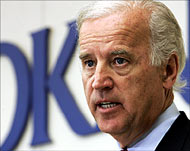US reveals blueprint for Iraq pullout
The White House has announced its plans to withdraw from Iraq, saying that a blueprint advocated last week by a Democratic senator was “remarkably similar” to its own.

It also signalled its acceptance of a recent US Senate amendment designed to pave the way for a phased US military withdrawal from the country.
The statement by Scott McClellan, the White House spokesman, came in response to a commentary published in The Washington Post by Joseph Biden, the top Democrat of the Senate Foreign Relations Committee, in which he said US forces will begin leaving Iraq next year “in large numbers”.
According to Biden, the US will remove about 50,000 servicemen from the country by the end of 2006, and “a significant number” of the remaining 100,000 the year after.
The blueprint also calls for leaving only an unspecified “small force” in Iraq to strike at fighters, if necessary.
U-turn
Less than two weeks ago, McClellan criticised John Murtha, a Democratic Representative, saying that his call for an immediate withdrawal from Iraq, endorsed “the policy positions of Michael Moore”, a stridently anti-war Hollywood filmmaker.
However,
 |
|
Senator Joseph Biden says 50,000 |
Biden’s ideas, relayed first in a speech in New York on 21 November, were more warmly received.
Even though President George Bush has never publicly issued his own withdrawal plan and criticised calls for an early exit, the White House said many of the ideas expressed by the senator were his own.
In the statement, released under the headline “Senator Biden adopts key portions of administration’s plan for victory in Iraq”, McClellan said the Bush administration welcomed Biden’s voice in the debate.
Remarkably similar
“Today, Senator Biden described a plan remarkably similar to the administration’s plan to fight and win the war on terror,” the spokesman said.
He said that as Iraqi security forces gained strength and experience, “we can lessen our troop presence in the country without losing our capability to effectively defeat the terrorists”.
McClellan said the White House now saw “a strong consensus” building in Washington in favour of Bush’s strategy in Iraq.
The Biden plan calls for preparatory work to the envisaged withdrawal to be done in the first six months of next year. It includes:
- Forging a compromise among Iraqi factions, under which the Sunnis must accept that they no longer rule Iraq, and Shia and Kurds admit them into a power-sharing arrangement
- Building Iraq’s governing capacity
- Transferring authority to Iraqi security forces
- Establishing a contact group of the world’s major powers to become the Iraqi government’s primary international interlocutor.
The White House statement also embraced a Senate amendment to a defence authorisation bill overwhelmingly passed by the Senate on 15 November that called for the administration to make 2006 “a period of significant transition to full Iraqi sovereignty” thereby creating conditions “for the phased redeployment of United States forces from Iraq”.
Reprimand to Bush
The measure was largely seen as a reprimand to the Bush administration, often accused of lacking a viable strategy in Iraq.
|
“Today, Senator Biden described a plan remarkably similar to the administration’s plan to fight and win the war on terror” Scott McClellan,White House spokesman |
But the White House again said the Senate was reading from its own playbook.
“The fact is that the Senate amendment reiterates the president’s strategy in Iraq,” the statement said.
The Bush administration has been steadily moving towards a reduction of US troops in Iraq, and Condoleezza Rice, Secretary of State, spoke last week of a reduction in the US presence for the first time.
Her remarks contrasted sharply with her refusal last month to tell a Senate panel whether US troops would be out in a decade, acknowledging that anti-US attacks would continue “for quite a long time”.